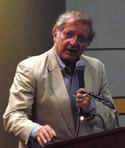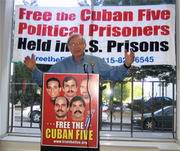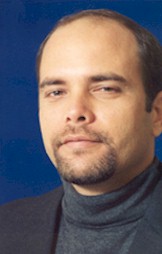
Tomado del Sitio del Comité Nacional por la Libertad de los Cinco Cubanos: www.freethefive.org
6 de agosto de 2007
Traducción por Juanita López
Exclusivo a www.freethefive.org
Entrevista con Leonard Weinglass, abogado de la apelación de Antonio Guerrero, realizada el 1ro. de agosto de 2007 por Gloria La Riva, coordinadora del Comité Nacional por la Liberación de los Cinco.
Gloria La Riva: Sr. Weinglass, la audiencia de la vista oral en la apelación de los Cinco Cubanos tendrá lugar ante el 11no. Circuito de la Corte de Apelaciones de Atlanta, el día 20 de agosto. Por favor, ¿puede usted explicar en qué situación se encuentra actualmente el caso de los Cinco Cubanos? ¿Cuáles son los argumentos que presentará la defensa?
Leonard Weinglass: La presentación de la vista oral será ante un tribunal compuesto por dos jueces. Posiblemente este tribunal sea aumentado a tres jueces, pero eso solo lo sabremos una semana antes de la presentación. Este es el mismo tribunal que inicialmente analizó el caso y decidió, en agosto de 2005, que los Cinco no habían tenido un juicio justo en Miami.
Esta decisión del año 2005 fue revertida por un panel completo de 12 jueces del 11no. Circuito, que votaron 10 a 2, por lo que el tema de la sede ya no lo podremos volver a presentar. Pero el resto del caso – apartándonos del tema del juicio justo y la sede – ha retornado al tribunal original, compuesto ahora por dos jueces, con la posible adición de un tercero, para la consideración de todos los aspectos restantes. El tercer juez se retiró hace aproximadamente dos años. Ahora tenemos un panel de dos jueces. Es posible que el tercer juez sea designado para la audiencia de este caso, pero nosotros lo sabremos solamente una semana antes de la presentación de los alegatos en la vista oral.
GLR: ¿Cuáles son los temas para la apelación?
LW: Tenemos una cantidad de temas que nos quedan, pero yo voy a resaltar los tres más importantes, que son los que tienen más posibilidades de ser incluidos en el alegato.
El primero es el referido a si procede o no la Causa No. 3, que alega una conspiración para cometer asesinato, contra Gerardo Hernández, surgiendo del derribo por parte de Cuba de dos aeronaves en el año 1996, y si se vaya a ser sostenida en la apelación.
La defensa está argumentando que la evidencia acerca de esa alegada conspiración es insuficiente desde el punto de vista legal. El argumento es sólido porque el gobierno en un punto del litigio reconoció que sus evidencias eran muy frágiles, y que de hecho no podían probar esa acusación. También está impactada por el hecho de que la corte de apelaciones, cuando nosotros argumentamos en un principio el caso en marzo de 2004 (el primer argumento oral ante el panel de tres jueces), también expresó su opinión acerca de que las evidencias en esta acusación eran frágiles. Por eso inicialmente nos concentraremos en eliminar la Causa 3.
Yo debo también puntualizar que esta es la primera vez en la historia en que un individuo ha sido responsabilizado por la acción de un estado soberano en defensa de su espacio aéreo. La Causa No. 3 nunca debió haber sido formulada, en primer lugar porque Cuba tenía el derecho de defender su espacio aéreo derribando esa aeronave. Pero aún asumiendo que fuera legalmente viable, nunca fue probada.
El segundo argumento que tendrá una significativa atención de la corte es el referido a la mala conducta en el proceso judicial, particularmente del fiscal (el Fiscal de los EEUU John Kastrenakes) en su alegato final ante el jurado.
El alegato final está constreñido por reglas muy precisas, que le prohíben al abogado argumentar más allá del alcance de la evidencia. En otras palabras, un fiscal no puede hacer afirmaciones en el alegato final que no estén sustentadas en evidencias o pruebas en el caso. En esta instancia particular el fiscal fue más allá de los límites del propio alegato.
Por ejemplo, él aseveró en un punto que los Cinco llegaron a los Estados Unidos no a monitorear las actividades de la red terrorista que había estado agrediendo al pueblo cubano, sino que, en lugar de eso, él alegó que el objetivo de los Cinco era destruir a los Estados Unidos. Esto fue mencionado no una, sino tres veces durante su alegato. Los Cinco estaban desarmados, no tenían explosivos, no cometieron actos de sabotaje o incendios, no amenazaron a nadie, pero aún así el fiscal hizo esa acusación.
Nosotros sostenemos que esta es una atroz mala conducta del fiscal y que, debido a ello, las dos acusaciones que alegan conspiración para cometer asesinato y la que alega conspiración para cometer espionaje, que son acusaciones con argumentos muy parecidos, deben de ser puestas a un lado. Y un nuevo tribunal debe ser otorgado con base de las mismas.
El tercer argumento en importancia es el referido a la sentencia de tres de los Cinco que fueron acusados de conspiración para cometer espionaje (Gerardo Hernández, Antonio Guerrero, Ramón Labañino). Cada uno de los tres que fueron acusados recibió sentencia de cadena perpetua. Una sentencia a cadena perpetua ahora significa que usted realmente permanecerá toda su vida en prisión, sin salir, hasta su muerte. Este caso fue el primero en la historia de los Estados Unidos donde no hubo ningún documento clasificado. Es decir, no había nada referido a documentos sobre seguridad nacional en este caso.
Históricamente los casos notables de espionaje son casos que involucran a individuos que le pasan a un país extranjero datos, a veces cientos y miles de secretos estatales. En esos casos esas personas – los más notables de ellos son personas como Robert Hansen, del FBI, Aldrich Ames de la CIA, Robert Walker de la Marina de Guerra, que entregaron cientos, sino miles, de documentos— cad uno recibió cadena perpetua.
Pero en el caso de los Cinco no se presentaron documentos de ese tipo. Sin embargo, los tres están guardando prisión por las mismas sentencias a cadena perpetua como en los casos de esos notables espías. Entonces nosotros estamos alegando que esta sentencia, dados los hechos de este caso, es opresiva, irracional y está fuera de los límites establecidos por la ley. Esta era una sentencia que, obviamente, estaba reservada para los patriotas cubanos, quienes tomaron la responsabilidad de revelar y tratar de prevenir el terrorismo que emana de los Estados Unidos dirigido contra Cuba.
Estos son los dos principales cargos de las 26 acusaciones, y el tercero es la mala conducta del fiscal.
Si triunfamos en estos aspectos, significará un largo trecho recorrido para llevar a los tres que están sentenciados a cadena perpetua, y a todos los Cinco, de regreso a sus hogares con sus familias y compatriotas en Cuba.
GLR: Usted mencionó que la fiscalía no presentó evidencias para probar sus acusaciones de conspiración para cometer asesinato contra Gerardo Hernández. Esta es una acusación extremadamente no usual e irregular dado que incluso el fiscal durante el juicio fue al 11no. Circuito de Apelaciones con un “mandato de prohibición” acerca de las instrucciones del juez, porque el fiscal dijo que no tenían evidencia para declarar culpabilidad. ¿Qué se requería específicamente para declarar culpabilidad en este caso en que al fiscal le faltaron las pruebas?
LW: Lo que se requería para declarar la culpabilidad, según las leyes de los Estados Unidos, era una prueba más allá de una duda razonable, de que Gerardo Hernández había llegado a un acuerdo cuyos objetivos eran llevar a la muerte a las cuatro personas que murieron cuando sus aviones fueron derribados. No existe evidencia alguna de que Gerardo Hernández tuviera algún conocimiento de que el derribo de los aviones iba a ocurrir. Por lo tanto el caso se cae en cuanto a las evidencias.
Más allá de eso, no debió, incluso, haber existido una acusación de esa naturaleza. Esta acusación era improcedente debido a que Cuba, un estado soberano, estaba protegiendo su propio espacio aéreo, y haciéndolo sus aeronaves militares derribaron aviones intrusos. Esta actividad nunca antes había resultado una acusación contra una persona que no estaba de forma alguna involucrada en la acción militar.
GLR: ¿Y la fiscalía no planteó también que Gerardo Hernández sabía que los aviones iban a ser derribados en aguas internacionales? Sin embargo, Gerardo no formaba parte de plan alguno para derribar los aviones, aunque este fue un acto justificado y legal realizado por Cuba.
LW: Correcto. No existe evidencia de que él supiera que iban a ser derribados. La única evidencia en el juicio fue que él recibió un mensaje desde Cuba de que sus compatriotas no deberían de volar en los aviones de Hermanos al Rescate durante aquel periodo.
[Nota: BTTR había invadido el espacio aéreo cubano en numerosas ocasiones en 1995 y 1996, a pesar de las repetidas advertencias de Cuba. El líder de BTTR, el terrorista sentenciado José Basulto, se había jactado públicamente, en declaraciones a la prensa de Miami, de que el 24 de febrero de 1996, su organización volaría sobre Cuba, y persistió en ignorar las advertencias de varias autoridades de los Estados Unidos y de Cuba. El gobierno de Cuba, el Departamento de Estado y la Administración de la Aviación Federal de los Estados Unidos notificaron a Basulto que Cuba estaba preparada para tomar acciones directas, con el fin de detener nuevas incursiones no autorizadas en el espacio aéreo cubano]
Donde fueron derribados los aviones no era directamente relevante, sin embargo el alegato del fiscal fue que Hernández era supuestamente parte de un acuerdo para derribar los aviones en aguas internacionales.
A Gerardo no le fue informado por qué sus compatriotas infiltrados en BTTR no deberían de volar, y tampoco fue informado acerca de lo que estaba sucediendo. Simplemente le informaron que sus compatriotas, que estaban allí con él, no deberían de volar. Esto estaba muy lejos de decir que él tenía conocimiento acerca de que iba a tener lugar un derribamiento de aviones.
GLR: Refiriéndonos a las sentencias a cadena perpetua, usted había explicado que en la prisión federal no había posibilidad de salir en libertad condicional, o de una puesta en libertad antes doctrina del término, excepto cuando el prisionero muere. ¿Esta política de cadena perpetua sin libertad condicional ha existido siempre, y si no es así, cuándo cambió?
LW: La libertad condicional fue abolida en el sistema federal en los Estados Unidos y yo creo que el cambio ocurrió aproximadamente en 1994. El caso de los Cinco surgió en 1998, después del cambio, por lo tanto los Cinco fueron sentenciados bajo la nueva regla con la libertad condicional abolida.
GLR: ¿Los prisioneros que fueron sentenciados a cadena perpetua antes de 1994 tienen derecho a la libertad condicional?
LW: Sí. Yo creo que ellos comienzan a tener ese derecho cuando han permanecido en prisión aproximadamente 32 o 34 años.
GLR: ¿Cómo afecta este caso las garantías a una justicia legal en que la mayoría de las personas en este país se han fiado en las cortes? ¿Y que más se puede hacer para los Cinco en cuanto al asunto de la sede?
LW: La decisión sobre la sede – que nosotros pudiéramos apelar en una etapa posterior ante la Corte Suprema de los Estados Unidos — afecta a todos los que son llevados ante la barra de la justicia en América. Las reglas sobre la sede, antes de esta decisión, eran reglas designadas para proteger a un defendido de ser llevado a un juicio ante una comunidad que se encuentra excitada como resultado del prejuicio en contra del acusado. Esta parte fundamental y legal del sistema de justicia penal fue socavada por la decisión del panel de los 12 jueces del 11no. Circuito en agosto de 2006.
Si nosotros perdemos ante este panel actual, entonces tenemos el derecho de plantear el tema de la sede ante la Corte Suprema de los Estados Unidos. Por lo tanto, esto afecta a todos los que son llevados a juicio en América.
El asunto de la sentencia afectará también a todos los que sean acusados de conspiración para cometer espionaje, debido a la naturaleza draconiana de la sentencia de los Cinco.
El cargo de conspiración para cometer asesinato contra Gerardo Hernández sentará un precedente primario, al acusar a una persona en los Estados Unidos de conspirar para acometer asesinato por un derecho soberano foráneo para proteger su propio espacio aéreo. Este caso en muchas formas tendrá su impacto sobre el estado de ley en los Estados Unidos.
GLR: A pesar de los obstáculos impuestos por el juez en el juicio, los abogados de la defensa de los Cinco trataron de mostrar la larga historia de terrorismo en Miami y la sola razón existente para la misión de los Cinco en Miami de detener el terrorismo. Desde que fueron condenados se han hecho descubrimientos, revelaciones de planes continuos en contra del pueblo cubano por los terroristas con base en Miami. Y, desde luego, en mayo, uno de los más notables, Luis Posada Carriles, fue liberado para ir a acompañar a sus cómplices en Miami. ¿Qué papel pueden jugar el descubrimiento de estas acciones en la lucha por la liberación de los Cinco?
LW: De los nueve aspectos que serán argumentados ante el panel de dos jueces, yo solo mencioné los tres principales. Existen otros seis aspectos. Uno de ellos es el de la justificación. Según la ley americana una persona acusada de un delito puede reconocer la comisión de tal delito, y después argumentar que la comisión del delito estaba justificada por la necesidad de evitar un daño mayor. Esta es una forma de defensa propia, extendida a actos que protegen a otras partes. Esto fue argumentado en el juicio primario. Pero la jueza del tribunal [Joan Lenard] apartó este tema del jurado, por lo que nunca fue tomado en cuenta por el mismo. Nosotros planteamos que esto era un error. Nosotros estaremos argumentando que la “defensa de la necesidad” debería haber sido sometida al jurado, porque los Cinco llegaron a los Estados Unidos con el fin de evitar más violencia, lesiones y daños a otros.
La razón por la cual yo no la mencioné inicialmente es que las cortes en los Estados Unidos tienen la tendencia a desacreditar a la defensa, particularmente en el contexto político en el que surgió este caso. De todas maneras, observe las revelaciones relacionadas con Posada Carriles, Orlando Bosch y otros, quienes el gobierno ha reconocido que estaban involucrados en acciones de terrorismo.
Los Cinco vinieron aquí para frenar sus actividades. Este caso presenta un record más fuerte que ningún otro caso de los que yo haya estado al tanto, por el argumento de que las actividades de los Cinco estaban justificadas y eran necesarias para salvar vidas.
GLR: ¿Tiene usted ejemplo del uso de “la defensa de necesidad”?
LW: Yo lo usé con éxito en la defensa de la hija del presidente Carter, Amy. Ella ocupó un edificio, con otros estudiantes, en la Universidad de Massachusetts, protestando porque los agentes de la CIA llegaron al campus a reclutar estudiantes para la CIA. Ella reconoció que ella ocupó el edificio y que eso era un delito, pero argumentó que estaba justificado por la doctrina de la necesidad, porque la CIA estaba comprometida entonces en una guerra ilegal en Nicaragua.
Esto fue argumentado al jurado y Amy Carter y los otros dieciséis estudiantes acusados fueron todos absueltos.
GLR: Si en esta apelación no se consigue una atenuación suficiente para los Cinco, ¿existe alguna otra posibilidad de apelación, sobre la base del argumento original de su misión antiterrorista?
LW: Bueno, en el juicio los abogados hicieron un buen trabajo mostrando a la corte y al jurado 35 pruebas demostrativas de la larga historia de violencia terrorista dirigida contra Cuba desde el área del sur de la Florida. También presentaron testigos en vivo quienes estuvieron involucrados en estas acciones, para que el jurado viera y oyera. De hecho, nuestro panel original de tres jueces, cuando escribió una opinión de 93 páginas revirtiendo el caso, debido a los prejuicios en Miami, cita en las notas al pie la evidencia que fue presentada en la corte, y se refiere a Posada Carriles como un terrorista. (La opinión de 93 páginas, con fecha 9 de agosto de 2005, está disponible en nuestro sitio web).
Esto fue todo ante el juez en el tribunal original, pero el juez apartó este tema de la vista del jurado. Ahora, si nosotros perdemos esta apelación, ¿podemos archivar una nueva apelación sobre habeas corpus, incorporando algunas de estas nuevas informaciones que han llegado a aclarar a partir del final del juicio? La respuesta es probablemente que sí, y esto es algo que nosotros, sin lugar a dudas, investigaremos, porque estamos llevando registros de todas las informaciones nuevas, una vez que el argumento está concluido, y una vez que tengamos una decisión.
GLR: La defensa está enfocada en tres aspectos principales en el alegato oral. ¿Es así porque el tiempo del equipo de la defensa está limitado a 30 minutos, o por los límites que ustedes tienen en total en la apelación?
LW: La apelación comprende un record de 119 volúmenes de transcripciones, 20 000 páginas de pruebas. Nosotros hemos recibido un total de 30 minutos para argumentar los nueve aspectos. Si los distribuyes, esto nos da tres minutos para cada aspecto. Como sucede con todas las apelaciones, los abogados tienen que analizar cuáles aspectos argumentarán. Después de la reunión con todo el equipo nos hemos concentrado en tres aspectos que nosotros sentimos que pueden llevarnos a revertir las acusaciones principales, y sentar las bases para la liberación de los Cinco.
Pero esto todavía nos da solo 5 o 6 minutos para cada uno de los aspectos que estamos tratando de argumentar. El límite de 30 minutos estipula los aspectos que nosotros seremos capaces de argumentar y qué tiempo le podremos dedicar a cada uno de ellos.
GLR: ¿Pueden ustedes tratar todos los aspectos en los informes escritos?
LW: Todos los aspectos están tratados detalladamente. Existe una limitación en el número de palabras que se puede poner en un informe escrito, y nosotros hemos usado todo el espacio que se nos ha asignado para argumentar los nueve aspectos.
GLR: Ha estado usted en comunicación recientemente con alguno de los Cinco Cubanos?
LW: Yo estoy en comunicación con más frecuencia con Antonio Guerrero. Justamente acabo de recibir una carta suya fechada el 19 de julio. Su moral, como es usual, está muy alta. Él está completamente consciente de lo que está pasando en la corte, y los argumentos que estamos próximos a presentar. Se mantiene fuerte y optimista.
GLR: Usted tiene una larga historia defendiendo a activistas políticos desde el año 1960. En este caso, con el movimiento existente en los Estados Unidos y en todo el mundo para apoyar la liberación de los Cinco, ¿cómo usted valora la importancia del apoyo político con relación a este caso?
LW: Este es el primer caso en nuestra memoria que será argumentado por tercera vez en apelación. Para todas nuestras memorias colectivas, esto no había sucedido nunca antes. ¿Por qué está sucediendo en este caso? Nosotros creemos que es por la atención interna e internacional que ha recibido este caso. Como abogados conocemos que tenemos el derecho de argumentar y el derecho de escribir apelaciones. Pero sabemos también, por experiencia, que el hecho de que los argumentos sean oídos o no, o de que las apelaciones sean tomadas seriamente depende, frecuentemente, de la intensidad del apoyo y de cuán amplio sea el interés en el caso.
Es gracias a todos aquellos que han trabajado diligentemente para llevar el caso de los Cinco Cubanos a la atención pública, que nosotros podemos tener la oportunidad de hacer una tercera presentación oral. Nosotros no podemos descansar hasta que Gerardo Hernández, Antonio Guerrero, Ramón Labañino, René González y Fernando González estén en sus hogares en Cuba con sus familias.
Muchas gracias.



 La más reciente entrevista a Gerardo!!!!
La más reciente entrevista a Gerardo!!!!